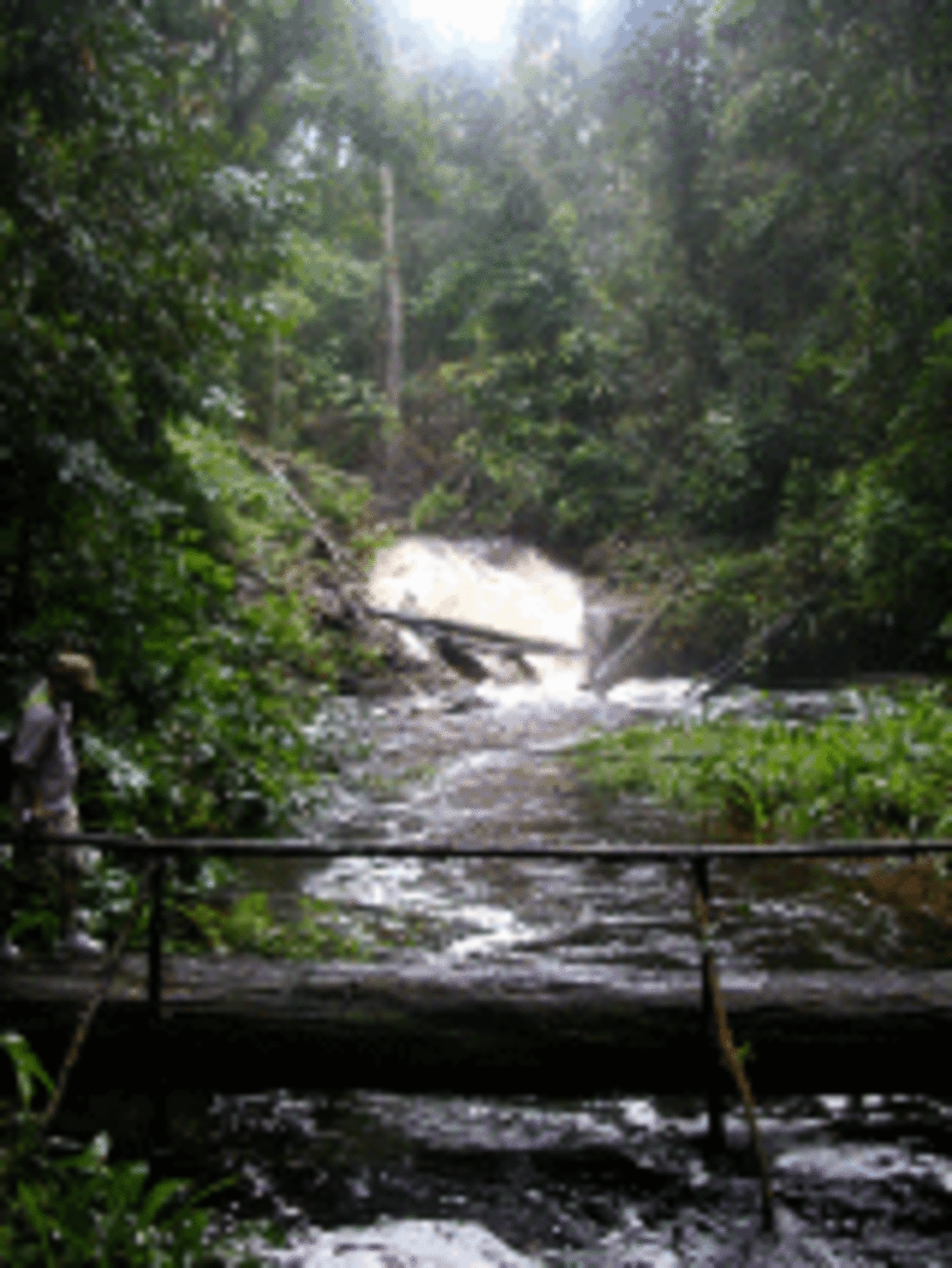Ted Sabat felt the bug first in the jungles of Malaya. A soldier in the British army, he went there four decades ago. A few years later, in 1971, he came to Guyana. "The forests looked so much the same," he says, "though Malaya was more hilly." Having caught Jungle Fever - not the kind that afflicted the protagonists in Spike Lee's brilliant movie about interracial relations - Ted, a Londoner, came back in 1981. He's rarely been away since.
For much of the year, you can find him either in Georgetown or at his camp near the Marshall Rapids, the falls that mark the start of the Amazonian basin. It is well off the beaten track, and getting there involves a long boat ride and a half-hour trek through the rainforest where you can see jaguar paw-marks among other things.
We start from Georgetown early in the morning, guided by Niranjan Pradeep - "Call me Chico" - who's been on this particular beat for 19 years. After a short trip by bus and a speed-boat ride on the massive Essequibo - the third largest river in South America - we stop for breakfast at Shanklands. "Eat well, the jaguars will be hungry," Chico says, not making everyone laugh. Fortified by cups of coffee and tea, we set off across the water to Bartica, a small town sustained by miners who go off for long periods into the interior.
You can see several of them, propped wearily on bar-stools sipping on their Banks, while the shopping mall across the way is empty except for the few of us who go in to get a drink. The proprietress of a souvenir shop tells us that the town's gearing up for the big Easter Sunday
regatta, an event that draws spectators from all over Guyana.
From Bartica, we go to Baganara House, a little island on the river that's also a resort. The lemonade is so good that everyone has two glasses, and the lunch isn't half bad either. There's a little strip of beach too, and the water's pleasant enough for a quick swim. The sky above is overcast and little drops of rain fall as we head for the jungle dock from where we'll journey to the falls.
Along the way, you can see Eddie Grant's residence on one of the little mid-river islands. Born in Guyana, Grant became famous with hits such as Baby, Come Back and Electric Avenue, though he's perhaps destined to be remembered most for the anti-Apartheid classic, Gimme Hope, Jo'anna, released just two years before the evil empire finally fell.
The likes of Mick Jagger, sometimes seen up in the stands at Georgetown's Bourda Oval, have stayed here, and Chico seems especially proud of the Plaisance-boy-done-good. Workmen are sprucing up the place as we whiz past in the boat, and we're informed that there are many small strips in the interior for Grant to land a private plane if he so wishes.
The last part of the journey is the most spectacular. After anchoring the boat on the periphery of the forest, we walk to Ted's camp. A guide, shirtless like Ted but carrying a machete, accompanies us to the rapids, talking about the two big cats that often come calling and the snakes and other wildlife. With the ground underfoot so squelchy, I'm more worried about leeches.
It's a half-hour walk through uneven terrain, and the falls themselves, when we glimpse them, aren't as awe-inspiring as the Kaieteur, which is five times as high as the Niagara. What you can do at the Marshall Rapids however is get the best water massage you ever will. If you're prepared to clamber across fallen branches, jagged rocks and slippery lichen, you can sit right under the falls as they pound down before the water flows into the Mazaruni River. I make my way across with Khalid Hussain of The News from Pakistan, and Christopher Martin-Jenkins of The Times, who shows remarkable agility for a man in his early 60s.
The water is as red as can be, not from iron-ore deposits as I suspected, but with tannin from the leaves and bark of the thousands of trees. Our backs, stiff from pounding away at keyboards, were been loosened by 20 minutes under the pouring water. We clamber out to find Ted there. "They laughed at me when I came here," he says. "I went for a loan to a British bank once, and they said: 'Sorry, we don't give loans for Africa.' No one had even heard of this place."
And now? "We get hundreds of visitors. You won't get this anywhere else in the Caribbean. This is as close to nature as most people will ever get." He escorts us back to base camp and as we prepare to leave, he says: "Who'd have thought it, eh? Eco-tourism, they call it now. When I came here, I don't think the word even existed."
Dileep Premachandran is an associate editor at ESPNcricinfo



